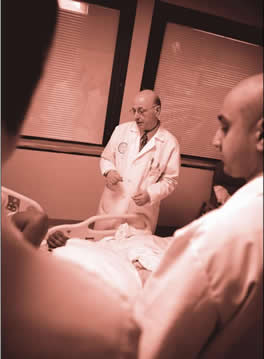The Otolaryngology Department at Rutgers New Jersey Medical School accepts three residents per year. The 5-year training program in Otolaryngology consists of 4 years of progressive training in Otolaryngology-Head and Neck Surgery, preceded by 1 year of general surgery.
PGY-1 Year
All residents do their general surgery training under the direction of the Otolaryngology Program Director and in collaboration with the Program Director for the Department of General Surgery. During the first year in general surgery, the interns rotate through various 1 month rotations that include other surgical services and a full 6 month otolaryngology block. While on the otolaryngology block, the residents assist in the operating room and play a pivotal role on the team.
PGY-2 Year
This year is spent full time within otolaryngology and is directed at developing clinical skills. Residents will learn how to take a history and perform a physical exam of the head and neck, which includes being able to do a fiberoptic exam. They will also be able to diagnosis and treat common disorders within otolaryngology. Residents will be exposed to pediatric and adult patients in both the inpatient and outpatient setting. Residents will also be involved in rotating through various specialty clinics which include Pediatric clinic, Head and Neck Oncology clinic, Rhinology/Skull Base clinic, Otology/Neurotology clinic, and General Otolaryngology clinic. They also have the otolaryngology pager and are responsible for seeing consults during the day. PGY-2 residents will become proficient in the following list of procedures: tonsillectomy/adenoidectomy, myringotomy, myringoplasty, laceration repair, neck mass excision, direct laryngoscopy and nasal endoscopy, tracheostomy, skin grafts, repair of complicated soft tissue wounds including free flap donor sites. The year is spent at 2 locations, University Hospital, Hackensack University Medical Center, and Newark Beth Israel. Residents will rotate between these two locations. |

|
PGY-3 Year
In the PGY-3 year, each resident will spend 3 months at University Hospital expanding their clinical outpatient and inpatient knowledge and expertise. They will be expected to know how to diagnose and treat complex head and neck disorders such as vertigo, acoustic neuromas, Meniere’s disease, and skull base tumors. They will also spend 5 months at the VA doing various types of cases. They also spend 3 months doing research within the department without any clinic responsibilities except for on call duties. Residents also get to spend 1 month with the Oral and Maxillofacial Surgery department at Rutgers. Here they will have a chance to learn the nuances of occlusion, extraction of teeth, and treatment of many oral cavity disorders. The second year otolaryngology resident also acquires knowledge and develops skills in the management of complex postoperative problems. They will finish the year being proficient in the following: tympanoplasty, mastoidectomy, sinus surgery, cochlear implantation, ossicular chain reconstruction, stapedectomy, endoscopic orbital decompression, septoplasty, and transphenoidal approaches to pituitary lesions.
PGY-4 Year
This year the resident splits his/her time between Hackensack and Rutgers doing 2 month rotations like in the PGY-2 year. Duringthis year, the resident has increased responsibility in the management of his/her patients. This is the year thatthe resident develops knowledge and experience in the management of various medical and surgical complications, as well as becoming aware of the various rehabilitation techniques and procedures currently being performed inotolaryngology. At the end of this year, residents will be proficient in: parotidectomy, thyroidectomy, modified neck dissection, maxillectomy, rhinoplasty, face lift, blepharoplasty, otoplasty, correction of congenital deformities, airway reconstructive cases, removal of nasopharyngeal tumors and advanced skull base cases, composite resections of the head and neck andTransoral Robotic Surgery. The 4th year resident will also help the chief resident with administrative duties when he/she is away as well as lead tumor board conferences. |
 |
PGY-5 Year
The Chief Resident Year is the final year of training and is one of complete responsibility of the service at University Hospital at Rutgers and the VA. It involves administrative duties pertaining to scheduling, residency training, teaching assignments, medical student education, completing ongoing research projects. They will present cases during tumor board and during quality improvement conferences. They will be responsible for guiding junior residents in and out of the operating room. In addition, the chief resident will be proficient in all the various fields of otolaryngology at the conclusion of the year. These types of cases are but not limited to total laryngopharyngectomy, tracheal resection and reconstruction, free flap surgery and microvascular anastamosis, temporal bone resection including acoustic neuroma resections and middle fossa approaches and complex skull base cases that are jointly conducted with the neurosurgical team. They will run the inpatient clinical service and round with the team in the mornings and evenings. They will have a supreme knowledge of medical and surgical complications and their treatments. The conclusion of the chief year will prepare him/her for an academic career if they so choose.
|

